Training Providers – Curriculum Modification Request Template
We want to ensure that the training content provided meets the high standards set forth by CalMHSA. Therefore, any substantive changes to training curricula previously approved by CalMHSA must receive prior approval before implementation.
Best Practice Guidelines for Employing Certified Medi-Cal Peer Support Specialists
Best Practice Guidelines for Employing Certified Medi-Cal Peer Support Specialists
Fee Schedule
Fees for the cost of application, training, and the certification exam along with biennial renewal and ancillary fees.
Training Curriculum – Crosswalk for CMPPS Certification
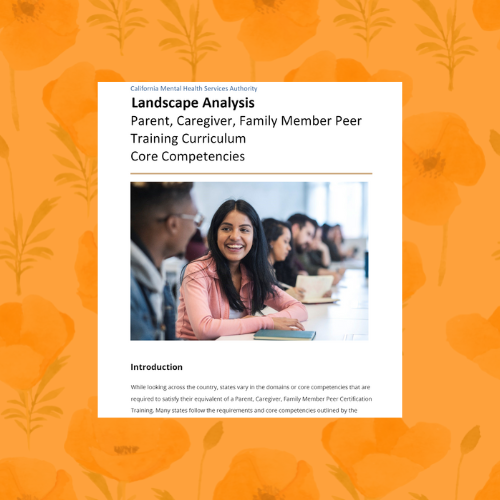
The landscape analysis document for Parent, Family, Caregiver specialization identifies the core competencies to inform training curriculum.
Certification Renewal & Continuing Education Requirements
To maintain certification, Certified Medi-Cal Peer Support Specialists (CMPSS) recertification is required every two years. This page covers the requirements for recertification and around continued education (CE) acceptable criteria.
Guidance for Advertisement of Certification
Guidance for the advertisement and credentials for Certified Medi-Cal Peer Support Specialists in California.
Code of Ethics Violation Guidelines
Back to Code of Ethics Code of Ethics Violation Guidelines The following guidelines are used to address violations of the Medi-Cal Code Ethics for Certified Peer Support Specialists in California by the California Mental Health Services Authority. The guidelines will be used by the certifying entity for the determination of sanctions. The guidelines are not […]
JAWS Screen Reader Accommodation
This documents is for test-takers who need screen reader technology. CalMHSA allows JAWS® screen reader software, which reads the text that is displayed on the computer screen to the test-taker, or human readers to assist test-takers by reading the exam aloud.
Exam Comfort Aid List
The below items are comfort aids and do not require a CalMHSA pre-approval or an accommodation request. They will be allowed in the testing room upon visual inspection by the Test Center or Online Proctored staff. Visual inspection will be done by examining the item without directly touching it (or the candidate) and without asking the candidate to remove the item, unless otherwise stated below.
Training Curriculum – Working with Justice Involved

The landscape analysis document for Parent, Family, Caregiver specialization identifies the core competencies to inform training curriculum.
Training Curriculum – Working with Persons Unhoused

The landscape analysis document for Parent, Family, Caregiver specialization identifies the core competencies to inform training curriculum.
Training Curriculum – Crisis Care Core Competencies

The landscape analysis document for Parent, Family, Caregiver specialization identifies the core competencies to inform training curriculum.
In-Person Exam: What to Expect
Download PDF Security and Admission Procedures Important: Your confirmation email will inform you how early to arrive at your appointment, make sure you arrive on time. Do not forget your identification. If you do not bring your identification, you cannot take the exam and will forfeit your exam fee. Admission Process 1. When you arrive, […]
How To – Upload Training Certificate

Download PDF The training completed for the initial Peer Support Certification must be an 80-hour course covering the 17 core competencies provided by a CalMHSA-approved training provider and completed after July 1, 2022. Below are the instructions on how to upload your training certificate to be approved to take the certification exam. Documents required: PDF, JPEG or PNG […]
Grandparenting Guidelines

This document describes grandparenting requirements such as employment date and hours, letters of recommendation, peer training, continued education hours, and exam.
Exam Accommodation Policy
The exam accommodation policy explains our policy and procedure to requests accommodations during the certification examination.
Glossary of Terms

Glossary of terms defines important certification language including: adult, beneficiary/recipient, CalMHSA, certificant, certification, certifying entity, code of ethics, continued education, core competencies, county reciprocity, culturally appropriate services, dual relationship, grandparenting process, initial certification, lived experience, Medi-Cal, natural supports, out-of-state-reciprocity, peer, Medi-Cal Peer Support Specialist, Medi-Cal Peer Support Specialist Services, prevalent languages, recertification, recovery, resiliency, training entity, trauma focused, valid certificate, and wellness.
Training Curriculum – Parent, Caregiver, Family Member Peer

The landscape analysis document for Parent, Family, Caregiver specialization identifies the core competencies to inform training curriculum.
Training Curriculum – General Peer Specialist Core Competencies
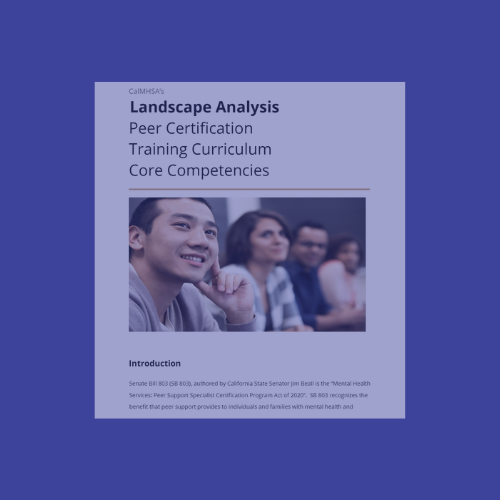
The landscape analysis document for Peer Support Specialists identifies the core competencies to inform training curriculum that will equip peers for completion of the Medi-Cal PSS certification process.
Code of Ethics and Violation Guidelines
These principles were identified by DHCS to guide Certified Medi-Cal Peer Support Specialists through their role and responsibilities. The code of ethics include concepts such as: hope, person-driven care, family-driven and child-centered care, holistic wellness, authenticity, cultural responsiveness, respect, integrity, advocacy, confidentiality, safety and protection, education, mutuality, reciprocity, strengths-based care, wellness, recovery and resiliency, and what Peer Support Specialists may NOT do. This document must be signed upon receiving certification.
Scope of Practice
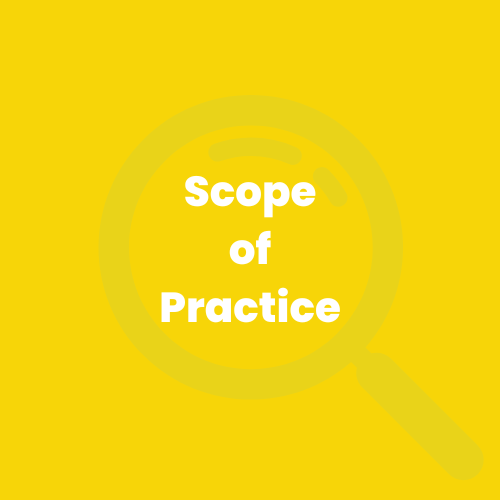
The scope of practice for Certified Medi-Cal Peer Support Specialists involves running educational skill building groups, supporting engagement, offering therapeutic activities, and following the code of ethics.
Core Competencies
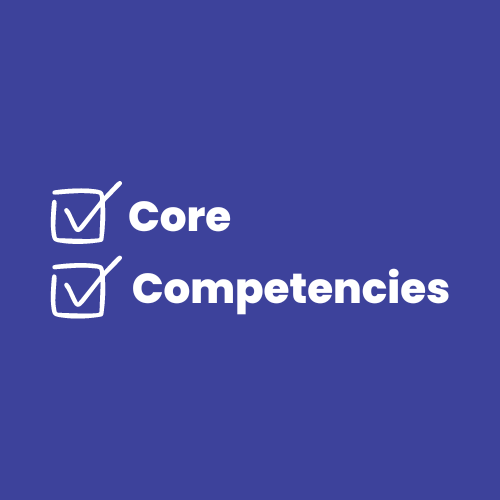
This document lists the 17 core competencies set by DHCS that Peer Support Specialists must be training in, including concepts like hope, recovery and wellness, the role of advocacy, the role of consumers and family members, psychiatric rehabilitation skills and service delivery,
and addiction recovery principles, including defined practices, cultural and structural competence trainings. trauma-informed care, group facilitation skills, self-awareness and self-care, co-occurring disorders of mental health and substance use, conflict resolution, professional boundaries and ethics, preparation for employment opportunities, including study and test-taking skills, application and résumé preparation, interviewing, and other potential requirements for employment, safety and crisis planning, navigation of and referral to other services, documentation skills and standards, confidentiality, digital literacy.
Guía de Instrucciones del Examen en Línea
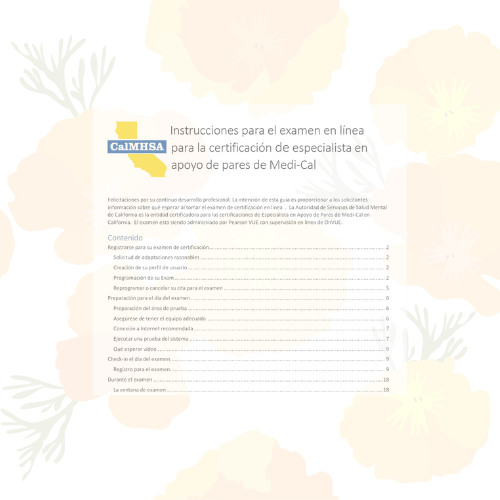
Instrucciones y preguntas frecuentes sobre el examen en línea: cómo inscribirse en el examen, cómo solicitar adaptaciones, cómo crear un perfil, cómo programar o reprogramar el examen, cómo preparar la zona de examen, el equipo necesario, qué esperar el día del examen, cómo presentarse al examen, el periodo de examen, los tipos de asistencia, las preguntas de asistencia antes, durante o después del examen y cómo obtener los resultados del examen.
Online Exam Instruction Guide
Online exam instructions and FAQs such as: how to register for exam, accommodations request, how to create profile, schedule or reschedule exam, preparing your exam area, required equipment, what to expect the day of, checking in for your exam, exam window, support types, support questions prior to, during, or after exam, and how to get your exam results.
Certification Exam Preparation Guide
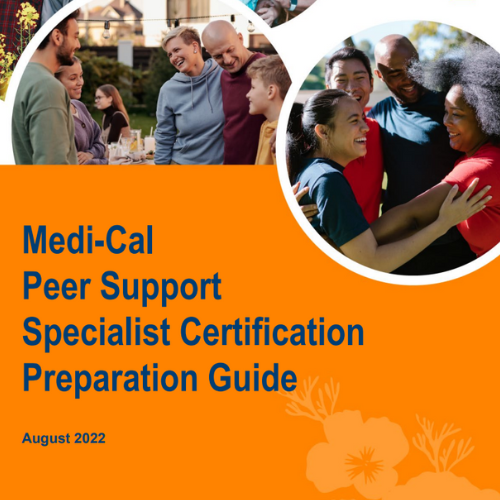
Guide to help applicants study for the exam, which includes core competencies, exam blueprint (e.g., types of questions, how many questions), eligibility, how to register for exam, reschedule or cancel exam, exam accommodations, test administration, scoring, receiving score, retake policy, appeals process, recommended study skills (e.g., goal setting, time management, organization, active learning), test taking strategies, test anxiety, practice exam questions, etc.
